 HEARTS & MINDS BEST BOOKS OF 2017 – PART ONE
HEARTS & MINDS BEST BOOKS OF 2017 – PART ONE
I know we usually enter this game a bit late — we are retail bookstore owners, after all, not professional reviewers or full-time bloggers, so we’re just a bit busy in the holiday seasons of December. Thanks for your patience while we pondered this remarkable year of very good books and tried to slim down my massive list.
I didn’t slim it down much, so stay tuned for PART TWO to be posted soon.
Thank you for humoring us as we present this faux awards show schtick. (Some soul on facebook last year complained, I think seriously, that her friend, an author I much ballyhooed, didn’t get a cash prize. Sorry. For those who have vision of grandeur about our small town operation here, there’s no medal or statue either.)
Every year I wonder if I should even do this thing: who am I to say what is “best” in a field of so many fabulous books? Best in whose eyes, for what purpose, for what kind of reader? Books aren’t “one size fits all” so we recommend week by week all kinds of titles for all sorts of purposes from all sorts of perspectives.
But some do stand out, titles I wish nearly everyone would know. Books I wish we sold more of. Books that are excellent, if only in a certain, specialized field. Books I truly want to honorably mention, shouting out to authors and publishers who have given us such good gifts.
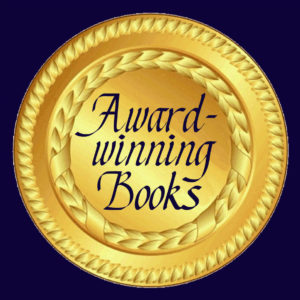 Here are some that captured my attention this year, books that we think were beautiful, good, important or fun. Some are grand, akin to the “Best Picture” or “Best Actress in a Leading Role” honors; others are maybe more like those technical award banquets they don’t even broadcast during the Academy Awards show, or the award for the “Best Short Feature in a Foreign Language” which may be really, really good but you may not care much. I hope you don’t skip any of these year end reviews, though.
Here are some that captured my attention this year, books that we think were beautiful, good, important or fun. Some are grand, akin to the “Best Picture” or “Best Actress in a Leading Role” honors; others are maybe more like those technical award banquets they don’t even broadcast during the Academy Awards show, or the award for the “Best Short Feature in a Foreign Language” which may be really, really good but you may not care much. I hope you don’t skip any of these year end reviews, though.
So, here are some of my favorite recommendations and best choices that deserve acclaim from 2017.
Prices shown are the regular retail prices. We will deduct 10% off any you order.
Just click on the “order” tab below which will take you to our secure order form page where you type in what you want. We’ll promptly reply and confirm everything, old-school.
THE BEST BOOK of 2017
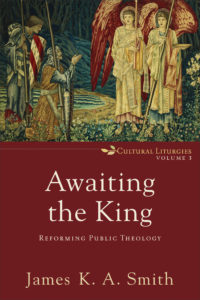 Awaiting the King: Reforming Public Theology James K.A. Smith (Baker Academic) $22.99 I have written at great length about why this third volume in the acclaimed “Cultural Liturgies Project” is worth wading through, why it is so very important, why it deserves to be considered one of the very best books of the year. It is by turns serious, a bit dense, but then playful and powerful. As with the others in the trilogy, Smith draws on the Kuyperian neo-Calvinism that has been so influential in our lives here and moves our conversation about worldview and cultural transformation towards liturgy and loves and embody faithfulness in but not of the world God so loves. In this hard season of political strife, it is particularly important to double down and study public theology well, and Smith is the perfect public intellectual, caring for the common good, aware of the ideologies around us, and eager to help GOd’s people be both faithful and fruitful in our public witness.
Awaiting the King: Reforming Public Theology James K.A. Smith (Baker Academic) $22.99 I have written at great length about why this third volume in the acclaimed “Cultural Liturgies Project” is worth wading through, why it is so very important, why it deserves to be considered one of the very best books of the year. It is by turns serious, a bit dense, but then playful and powerful. As with the others in the trilogy, Smith draws on the Kuyperian neo-Calvinism that has been so influential in our lives here and moves our conversation about worldview and cultural transformation towards liturgy and loves and embody faithfulness in but not of the world God so loves. In this hard season of political strife, it is particularly important to double down and study public theology well, and Smith is the perfect public intellectual, caring for the common good, aware of the ideologies around us, and eager to help GOd’s people be both faithful and fruitful in our public witness.
I particularly like that Smith is so very clear about his own theological heritage and the tradition in which he stands but he is generously and insightfully astute about others, Catholics, the Radical Orthodox movement, black liberation theology, and more. This is the mark of an excellent book, I think, and I applaud his considerable gift in being able to do this. Agree or not with all of it, this is a very important book, and a fine one, and I urge you to consider it.
Of course, we’ve named the more accessible one-volume summary of the whole trilogy, You Are What You Love: The Spiritual Power of Habit, one of the books of the decade, so if the three big ones are too daunting, start there. In any event, Awaiting the King is a masterpiece of writing that wonderfully teeters on the edges of being scholarly and popular, prophetic and pastoral, academic and relevant. Kudos to Smith and his publishers at Baker.
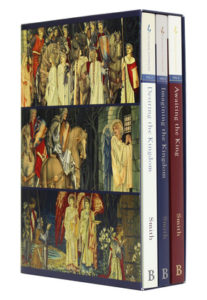 For what it is worth, there’s a handsome paper slipcase we have for the trilogy and one can by all three in that nice boxed set. It includes Desiring the Kingdom: Worship, Worldview, and Cultural Formation and Imagining the Kingdom: How Worship Works and Awaiting the King: Reforming Public Theology. $66.99
For what it is worth, there’s a handsome paper slipcase we have for the trilogy and one can by all three in that nice boxed set. It includes Desiring the Kingdom: Worship, Worldview, and Cultural Formation and Imagining the Kingdom: How Worship Works and Awaiting the King: Reforming Public Theology. $66.99
BEST MEMOIRS and CREATIVE NON-FICTION
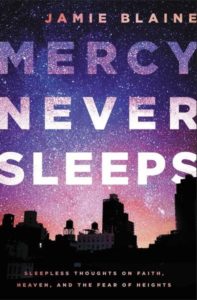 Mercy Never Sleeps: Sleepless Thoughts on Faith, Heaven, and the Fear of Heights Jamie Blaine (Nelson) $16.99. I hope you know Blaine’s amazing book about being a late night psychiatric counselor (and roller-rink manager) that we’ve promoted heartily the last two years. This is his newer one, reflections on his small-town, Southern lifestyle with his ponytail and heavy metal tee shirts, his fascination with pinball and helping hurting people. Maybe God still moves in mysterious ways, he says, when he (again) realizes his life isn’t unfolding as planned. As it says on the back “a twist of fate places the late-night psychiatric crisis guy on 24/7 call, his insomnia ramps up to desperate stages as he veers closer to becoming the very kind of person he’s trying to save.
Mercy Never Sleeps: Sleepless Thoughts on Faith, Heaven, and the Fear of Heights Jamie Blaine (Nelson) $16.99. I hope you know Blaine’s amazing book about being a late night psychiatric counselor (and roller-rink manager) that we’ve promoted heartily the last two years. This is his newer one, reflections on his small-town, Southern lifestyle with his ponytail and heavy metal tee shirts, his fascination with pinball and helping hurting people. Maybe God still moves in mysterious ways, he says, when he (again) realizes his life isn’t unfolding as planned. As it says on the back “a twist of fate places the late-night psychiatric crisis guy on 24/7 call, his insomnia ramps up to desperate stages as he veers closer to becoming the very kind of person he’s trying to save.
This is a story of self discovery, a memoir of faith, both hilarious and heartbreaking. It’s one heck of a wild story for anyone who has felt like they were losing it, “lost and stumbling” and a “field guid to making peace with your own rambling path home.” If you liked Midnight Jesus you’ll love Mercy Never Sleeps. It’s one of the best of the year.
I love the cover, too, those deep stars. Nice job.
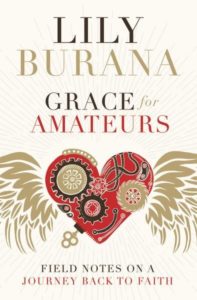 Grace for Amateurs: Field Notes on a Journey Back to Faith Lily Burana (Word) $22.99. This is one of the most memorably books I’ve read all year, certainly a personal favorite, and a title that I am eager to share with those who have an open mind and want to listen in on the faith journey of a feisty, progressive, hurting, hilarious woman who is vivid in following Jesus in some unusual ways. Lily starts the book telling of her depression — the meds aren’t working as they used to — and her desperation as she seeks for a sign from God. Her sister is a PC(USA) pastor and she has some Catholic relatives so not unfamiliar with faith. After what seems to be a bona fide miracle and her subsequent conversion she searches for a church (meeting with folks at Tim Keller’s NYC church, but not joining because they aren’t fully inclusive of LGTBQ folks) and continues one describing her ups and downs on this new faith journey.
Grace for Amateurs: Field Notes on a Journey Back to Faith Lily Burana (Word) $22.99. This is one of the most memorably books I’ve read all year, certainly a personal favorite, and a title that I am eager to share with those who have an open mind and want to listen in on the faith journey of a feisty, progressive, hurting, hilarious woman who is vivid in following Jesus in some unusual ways. Lily starts the book telling of her depression — the meds aren’t working as they used to — and her desperation as she seeks for a sign from God. Her sister is a PC(USA) pastor and she has some Catholic relatives so not unfamiliar with faith. After what seems to be a bona fide miracle and her subsequent conversion she searches for a church (meeting with folks at Tim Keller’s NYC church, but not joining because they aren’t fully inclusive of LGTBQ folks) and continues one describing her ups and downs on this new faith journey.
Lily Burana is an excellent, colorful writer — she reminds me a bit of her friend Nadia Bolz-Weber — who has penned three previous books, one about her previous life as a stripper, another about her good marriage to an Army soldier, and a novel entitled Dagger. So, yeah. She’s, uh, interesting, to say the least. Grace for Amateurs has been described as “a collection of linked essays that chronicle her spiritual recovery.” Her world may seem a bit eccentric for some, but it’s a beautifully done story with lots of passion and pathos. I truly loved it.
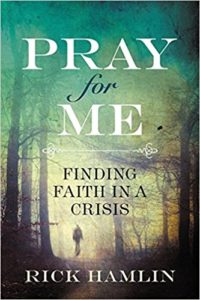 Pray for Me: Finding Faith in a Crisis Rick Hamlin (FaithWords) $20.00. You may know Hamlin’s name from his long-standing work at the ever-popular Guideposts or his amazingly written, well-reviewed 1997 book Finding God on the A Train. Yes, this book is a narrative about needing intercession and there is much to learn about the spiritual disciplines of listening prayer. The foreword alone is a brilliantly written, insightful rumination on how distracted we are when we attempt our daily quiet times. But is is more, much more, than a story of needing prayer.
Pray for Me: Finding Faith in a Crisis Rick Hamlin (FaithWords) $20.00. You may know Hamlin’s name from his long-standing work at the ever-popular Guideposts or his amazingly written, well-reviewed 1997 book Finding God on the A Train. Yes, this book is a narrative about needing intercession and there is much to learn about the spiritual disciplines of listening prayer. The foreword alone is a brilliantly written, insightful rumination on how distracted we are when we attempt our daily quiet times. But is is more, much more, than a story of needing prayer.
Pray for Me is the well told tale of a mysterious illness, of the confusion of the unknown, of our health care system, of family and friends and love and grace in times of trouble. As Sue Monk Kidd writes,
Here is a compelling story about a man suddenly leveled by a mysterious illness who grapples with fundamental questions of faith and prayer. Pray for Me is an utterly relatable book full of honesty and hope.
Really smart folks have appreciated this lovely book — there is a great blurb on the back by historian Thomas Cahill —and those who like good writing will adore it. Rick Hamlin, one observer says, “is the largest-hearted of men.” This makes for a powerful read when he struggles with doubt and re-discovered the deeper insights about prayer. This is a restorative, healing book.
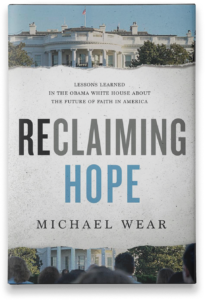 Reclaiming Hope: Lessons Learned in the Obama White House About the Future of Faith in America Michael Wear (Nelson) $25.99 Although we often stock this book in our politics section, for obvious reasons, I want to here award it a very honorable mention in this category of memoirs. Michael is a friend — he was good enough in his busy schedule to do a book talk and signing for a small group here at the shop — and he has much insight about a balanced, Biblical, non-partisan view of Christian political life. His experiences in, and his hard decision to leave, the Obama White House, is reported well here as he tells his story of coming to faith, learning about racial issues, growing to care about civic life, eventually working in the Obama campaign, and then taking up his role as one of the youngest ever White House staffers. He gives blow by blow coverage of many things that happened that first term with the first black President. Michael weighs in, wisely, I think, about what it means to be an evangelical Democrat, and how to navigate differences of theology and public policy on hot button issues from same sex marriage to abortion to religious liberty cases.
Reclaiming Hope: Lessons Learned in the Obama White House About the Future of Faith in America Michael Wear (Nelson) $25.99 Although we often stock this book in our politics section, for obvious reasons, I want to here award it a very honorable mention in this category of memoirs. Michael is a friend — he was good enough in his busy schedule to do a book talk and signing for a small group here at the shop — and he has much insight about a balanced, Biblical, non-partisan view of Christian political life. His experiences in, and his hard decision to leave, the Obama White House, is reported well here as he tells his story of coming to faith, learning about racial issues, growing to care about civic life, eventually working in the Obama campaign, and then taking up his role as one of the youngest ever White House staffers. He gives blow by blow coverage of many things that happened that first term with the first black President. Michael weighs in, wisely, I think, about what it means to be an evangelical Democrat, and how to navigate differences of theology and public policy on hot button issues from same sex marriage to abortion to religious liberty cases.
Wear talks about the integration of faith and politics well — he has done his homework and knows the best thinkers and activists and organizations that think about Christians and government — but the heart of this book is his own story, his brave story, of being a young man who wants to enter public service and, as a fairly young Christian, joins in this historic episode in American public life.
Michael experienced first hand many of the things we have read about in the news magazines and his telling has a clear view, his writing has a nice voice, as they say. This is a memoir of political service, a faith journey, a story of finding and losing one’s vocation. No matter what your own political views, I think you’ll be captivated by this honest story of living with faith in hard political years and how he discovered renewed hope. Highly recommended.
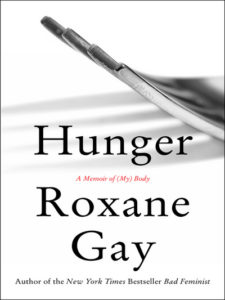 Hunger: A Memoir of (My) Body Roxane Gay (Harper) $25.99 Most of the memoirs I write about here are those of people of faith, Christians who perhaps come to deeper insight about their lives as they journey along the life of faith, curious and unpredictable as it may be. If there is value, and great reading pleasure, in listening in as others narrate their lives and makes sense of their days, what about those who narrate their lives with reference to God or Biblical truth about redemption? Obviously — I hope BookNotes readers think it is obvious —all people made in the image of God have a story to tell and there is often great worth in reading about how others unfold their stories, for better or worse. And, interestingly, many of my very favorite books are these kinds — not mere factual biography or autobiography of famous people, but accounts of more ordinary folk telling the tale of how they make sense of their lives, often in light of hard times, struggle, pain, loss.
Hunger: A Memoir of (My) Body Roxane Gay (Harper) $25.99 Most of the memoirs I write about here are those of people of faith, Christians who perhaps come to deeper insight about their lives as they journey along the life of faith, curious and unpredictable as it may be. If there is value, and great reading pleasure, in listening in as others narrate their lives and makes sense of their days, what about those who narrate their lives with reference to God or Biblical truth about redemption? Obviously — I hope BookNotes readers think it is obvious —all people made in the image of God have a story to tell and there is often great worth in reading about how others unfold their stories, for better or worse. And, interestingly, many of my very favorite books are these kinds — not mere factual biography or autobiography of famous people, but accounts of more ordinary folk telling the tale of how they make sense of their lives, often in light of hard times, struggle, pain, loss.
Roxane Gay is a brilliant literary star these days, with a best-selling collection of brilliant essays (Bad Feminist), a collection of short stories (Difficult Women) that, although often vividly sexual in nature, are luminous in their excellent writing, and also a highly regarded 2014 debut novel. Hunger is her memoir, telling of being gang-raped by classmates as a 12 year-old, how that effected her life, especially regarding her now seriously overweight body. Although this gripping story is hard to read — obviously the decades long aftermath of the sexual violence, about which she had not spoken previously, is heart-wrenching, but her descriptions of her own struggles with obesity and body image and food and eating is painfully, exceptionally moving. Her describing the difficulties of being a large woman on the road (as a public speaker, doing author readings and book panels and appearing at forums on race and feminism) is eye-opening and compelling. Her range as a storyteller — from well-crafted, beautiful lines to often very straight-forward, prosaic reporting — is exceptional and her abilities as a writer are remarkable. There is a reason she has become famous within the literary world, although now her artful wordsmithing seems to have taken somewhat of a back seat to her advocacy as a voice for those who are fat, her voice on issues of feminism and rape culture, and, of course, about her own journey as a dark-skinned Haitian-American.
Hunger is about her life, her body, her desires (and yes, her family and her work and her lovers and friends.) It is certainly one of the most memorable books I’ve ever read. God bless Roxane Gay.
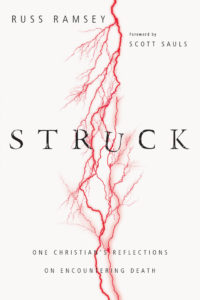 Struck: One Christian’s Reflections on Encountering Death Russ Ramsey (IVP) $16.00. I must say that most days I am not at all interested in books about after-life experiences, close encounters of any kind, the dramatic stuff about going to heaven and such. This book is not one of those, but I thought it might be. I knew this impeccably responsible publisher with high literary standards wouldn’t do anything dumb, let alone anything shallow, and the great cover drew me in, so I took a look. And, man, what a book!
Struck: One Christian’s Reflections on Encountering Death Russ Ramsey (IVP) $16.00. I must say that most days I am not at all interested in books about after-life experiences, close encounters of any kind, the dramatic stuff about going to heaven and such. This book is not one of those, but I thought it might be. I knew this impeccably responsible publisher with high literary standards wouldn’t do anything dumb, let alone anything shallow, and the great cover drew me in, so I took a look. And, man, what a book!
I now see why this book is short-listed for the upcoming Gold Medallion Awards; it is a very well written and theologically astute story about a Presbyterian pastor who needs emergency open heart surgery (from a bacterial infection that destroyed his mitral valve.) It is a “profoundly eloquent journey” that starts with this telling observation: “When my doctor told me I was dying, I came alive.”
However, this being alive is only part of the story — he admits to anger (including at people who disappeared during this needy time in his life) and he explores how hard it was that the dangerous surgery happened on his 18th wedding anniversary. The post-surgery depression and the spiritual questions about near-death stuff are raw and real.
I very highly recommend Struck. I’m not alone, either — the blurbs on the back are curiously diverse (which is always a good sign, I think) with raves from Leif Eager (the remarkable author of the novel Peace Like a River) and Barnabas Piper (who has a great book on curiosity, by the way) and singer-songwriter Sandra McCracken. Ramsey wrote a book about Jesus that I really liked, by the way, called Behold the King of Glory. This is a raw story of fear, depression, loss, grace, and hope and a very fine memoir.
 Danger, Man Working: Writing from the Heart, the Gut, and the Poison Ivy Patch Michael Perry (Wisconsin Historical Society) $18.95. I’ll admit this isn’t exactly memoir, although Perry is a born storyteller, he has a remarkably vivid sense of place, and is self-aware enough to ruminate (sometimes tenderly, sometimes with brutal honesty, sometimes with hilarious goofiness) on his own inner life and personal attitudes. So these are short pieces in the vein of one of my very favorite books from last year, Roughneck Grace: Farmer Yoga, Creeping Codgerism, Apple Golf, and Other Brief Essays from on and Off the Back Forty (also a collection of rural life pieces from the Wisconsin Historian Society magazine.) Beth thinks she liked Roughneck better, but we both adore his writing and his stories.
Danger, Man Working: Writing from the Heart, the Gut, and the Poison Ivy Patch Michael Perry (Wisconsin Historical Society) $18.95. I’ll admit this isn’t exactly memoir, although Perry is a born storyteller, he has a remarkably vivid sense of place, and is self-aware enough to ruminate (sometimes tenderly, sometimes with brutal honesty, sometimes with hilarious goofiness) on his own inner life and personal attitudes. So these are short pieces in the vein of one of my very favorite books from last year, Roughneck Grace: Farmer Yoga, Creeping Codgerism, Apple Golf, and Other Brief Essays from on and Off the Back Forty (also a collection of rural life pieces from the Wisconsin Historian Society magazine.) Beth thinks she liked Roughneck better, but we both adore his writing and his stories.
Danger, Man Working revisits common themes for Perry — cleaning the chicken coop (that would be the building about which he wrote in his full-on memoir, which we loved, Coop) and messing around with his vehicles (like in the bigger book Truck: A Love Story.) He does share a New York elevator with a group of supermodels, and I don’t think he’s ever written about that before. So, it’s not exactly a memoir, but these short pieces are so well written and so telling about his life as a part time farmer and local fire department guy, and so much about his daily shenanigans that I think it qualifies to be listed in this field known for very creative nonfiction.
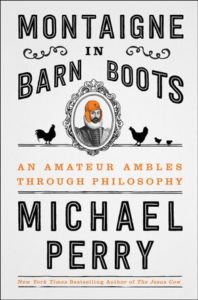 By the way, I think I want to celebrate and maybe even award his brand new one, that came out in November, with some kind of an award — best funny book about Farmer Philosophy and the Meaning of (Rural) Life? — but I have to admit we haven’t read it yet. Can I give a tentative award to Montaigne in Barn Boots: An Amateur Ambles Through Philosophy (Harper; $25.99.) If it’s awful, I’ll take it back, but either way, I’m sure I’ll write about it again. Stay tuned.
By the way, I think I want to celebrate and maybe even award his brand new one, that came out in November, with some kind of an award — best funny book about Farmer Philosophy and the Meaning of (Rural) Life? — but I have to admit we haven’t read it yet. Can I give a tentative award to Montaigne in Barn Boots: An Amateur Ambles Through Philosophy (Harper; $25.99.) If it’s awful, I’ll take it back, but either way, I’m sure I’ll write about it again. Stay tuned.
BEST BOOKS OF BASIC DISCIPLESHIP AND CHRISTIAN FAITH FORMATION
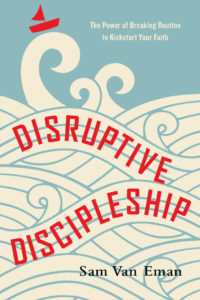 Disruptive Discipleship: The Power of Breaking Routine in to Kickstart Your Faith Sam Van Eman (IVP) $16.00. We’ve thought long and hard about this as it is a genre of books of which there are thousands; dozens are very, very good and we are hard pressed to name just a few that can be life changing, helpful, well-done and inspiring. So this is a hard call, as there are just so many worthy books that can help us in our daily discipleship and ordinary Christian living.
Disruptive Discipleship: The Power of Breaking Routine in to Kickstart Your Faith Sam Van Eman (IVP) $16.00. We’ve thought long and hard about this as it is a genre of books of which there are thousands; dozens are very, very good and we are hard pressed to name just a few that can be life changing, helpful, well-done and inspiring. So this is a hard call, as there are just so many worthy books that can help us in our daily discipleship and ordinary Christian living.
Further, I don’t want you to not take this seriously because I’ve already said, in more than one review at BookNotes, that Sam is a dear friend and a local guy who works for CCO. I admire him very much and respect his work as a leader of experiential education, wilderness trips, mission experiences and more. But, whether it looks like I’m cozying up to him because he’s a pal or not, I am convinced this is one of the best books of this sort I’ve read in years. It is interesting, Biblical, well-written, and pushes us to allow God to transform us in ways that are both a bit outside the box and yet utterly sensible.
I hardly know of another book that reminds us of what fancier books might call learning theory or pedagogy, and makes a thoughtful case for experiential design; that is, being intentional about what really transforms us. We know from Jamie Smith — You Are What You Love and Imagining the Kingdom — that just learning new content and absorbing into our brains new ideas isn’t adequately transforming. New life don’t come from new ideas alone. Sam helps us understand why and, better, pushes us towards arranging fresh projects to kickstart our Christian growth. He shows that breaking routine, disrupting things a bit where we have to rely on God or think about our faith or practice new habits, really are the learning contexts where real Christian formation happens. He tells great stories of adventure education and ordinary family situations and common experiences in small groups or among friends, where lasting growth happened and folks emerged more mature in Christ. Do you want more faith, hope, love? Do you desire to get out of the doldrums and actually go somewhere in your faith this year? Do you want to get that extra bit of jolt to drive you to deeper faithfulness? Disrupt things a bit. Sam has your back. This book can be your field guide.
As Mark Scandrette (of Practicing the Way of Jesus and Belonging and Becoming: Creating a Thriving Family Culture) puts it:
Disruptive Discipleship explores how to get unstuck and say yes to the good reality we were created for. We don’t learn or grow by getting new information. We have to risk experimenting with new practices, experiences, and challenges. Sam Van Eman is an enthusiastic, honest, and seasoned guide to this adventure.
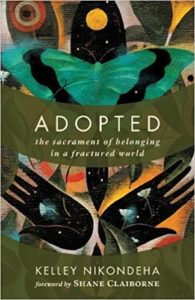 Adopted: The Sacrament of Belonging in a Fractured World Kelly Nikondeha (Eerdmans) $16.99. This creative boundary-crossing, multi-disciplinary book deserves any number of awards as it is so, so good, and covers so many topics and categories. It is, officially, I suppose, theology. But it really isn’t academic and not that sort of rigorous scholarly exploration, so it feels more like “basic Christian growth.” It is about adoption, so it’s a family book. The author — as I explained in a previous BookNotes column — is an adoptive mother in Africa so it is also about international justice, bi-racial stuff, practical theology of the global sort. Her reflections on being adopted —both literally into her family as a child and adopted by God, as a metaphor for salvation — are thoughtful, generative, important. That she offers this theological voice as a mom, in Africa, makes it simply remarkable and not a little bit thrilling.
Adopted: The Sacrament of Belonging in a Fractured World Kelly Nikondeha (Eerdmans) $16.99. This creative boundary-crossing, multi-disciplinary book deserves any number of awards as it is so, so good, and covers so many topics and categories. It is, officially, I suppose, theology. But it really isn’t academic and not that sort of rigorous scholarly exploration, so it feels more like “basic Christian growth.” It is about adoption, so it’s a family book. The author — as I explained in a previous BookNotes column — is an adoptive mother in Africa so it is also about international justice, bi-racial stuff, practical theology of the global sort. Her reflections on being adopted —both literally into her family as a child and adopted by God, as a metaphor for salvation — are thoughtful, generative, important. That she offers this theological voice as a mom, in Africa, makes it simply remarkable and not a little bit thrilling.
I want to tell many about this book and it would be a shame if it falls between the cracks, too serious for basic Christian living readers, seemingly not textbooky enough for serious theology students, not practical enough for self-help parenting selections but a bit too much about home and family for serious social justice folk. It could fall through the cracks, but let’s hope it works the other way around — each of the sorts of readers should consider it, and it really will be a great read for those interested in social justice, in theology, in spiritual formation, in daily discipleship, in family studies, in global concerns. It is about belonging, and that is a phrase pregnant with meaning, ripe with all kinds of fruit.
Brian McLaren is right to say that “Kelley Nikondeha writes with the heart of a poet and a theologian.” She writes as an orphan and adopted child and as a young adoptive parent. “Who could have guessed,” Brian writes, “that her story could give such rich insight into theology, family, society, racism, fear, and belonging?”
Listen to what Christian Cleveland says:
Part memoir, part theological exposition, Adopted: The Sacrament of Belonging in a Fractured World expands our understanding of what it means to be the family of God. As both an adopted person and an interracial adoptive parent, Kelley Nikondeha writes with transparency, tenderness, and racial awareness. This wonderful book will illuminate a path for all people to experience sacred relationships.
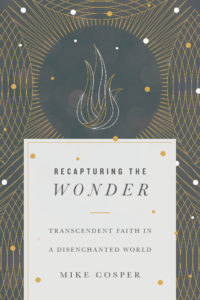 Recapturing the Wonder: Transcendent Faith in a Disenchanted World Mike Cosper IVP) $17.00 I don’t know Mike Cosper but I feel like I should — I’ve awarded as a “best Hearts & Minds book of the year” his last three books. I truly loved his 2013 book on worship Rhythms of Grace: How the Church’s Worship Tells the Story of the Gospel and his 2014 book The Stories We Tell: How TV and Movies Long for and Echo the Truth (both published by Crossway; $15.99 each.) And now this, his magnificent Recapturing the Wonder. He’s a very fine writer, a solid young thinker. He obviously cares about solid theology that can help us understand how to faithfully indwell the unfolding Biblical story in a way that helps us make sense of and work for the renewal of secular culture. That is, he’s my kind of guy.
Recapturing the Wonder: Transcendent Faith in a Disenchanted World Mike Cosper IVP) $17.00 I don’t know Mike Cosper but I feel like I should — I’ve awarded as a “best Hearts & Minds book of the year” his last three books. I truly loved his 2013 book on worship Rhythms of Grace: How the Church’s Worship Tells the Story of the Gospel and his 2014 book The Stories We Tell: How TV and Movies Long for and Echo the Truth (both published by Crossway; $15.99 each.) And now this, his magnificent Recapturing the Wonder. He’s a very fine writer, a solid young thinker. He obviously cares about solid theology that can help us understand how to faithfully indwell the unfolding Biblical story in a way that helps us make sense of and work for the renewal of secular culture. That is, he’s my kind of guy.
This new book reminds us that, in fact, there isn’t exactly anything called “secular culture.” “This is Our Father’s World” the old hymn says, and Cosper understands this. But something is fishy these days, our modernist story has somehow disenchanted the world; we don’t need Charles Taylor to tell us that (although he helps, and Cosper has read him.) Recapturing the Wonder puts it squarely on the table: what does it mean to live in a world that is ablaze with God, that is created and good and should bring us great joy? How does our faith in the supernatural —transcendence! — help us see and live life in a way that opens us to awe and wonder and joy and God? I love this book and you should too.
There are some mature reviews on the back cover, from Russell Moore and Karen Swallow Prior to Matt Chandler (who says it is “deeply spiritual, easily accessible, and creatively written”) but I like the simple promise of Kyle Idleman:
Pulls you in from the first story of a tomcat catching a raccoon and keeps you reading until the final challenge to live the good life, You will love it.
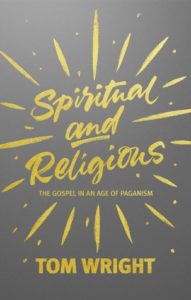 Spiritual and Religious: The Gospel in an Age of Paganism N.T. Wright (SPCK) $15.00. How glad are we that N.T Wright’s first book — released under his common name “Tom” in the 1990s in the US as Bringing the Church to the World and long out of print — is now available in a revised and updated edition. The Brits at SPCK have happily seen to it that that previous book, with its trenchant critique of new age thinking and alt-paganism so popular in that era, finds a home again, now, when “spiritual but not religious” is the religion of choice of so many. That expression is well worth pondering and there have been many who have critiqued it harshly and many others who think the church can merely accommodate itself to relate well to those spiritual longings and find easy fellowship with that sort of vision. Wright, here, wisely, I am certain, does a bit of both, offering hard-hitting critique of the notions of spirituality that are essentially pagan, and yet offering pastoral care for those stuck in worldviews and lifestyles that are, finally, not life-giving or coherent.
Spiritual and Religious: The Gospel in an Age of Paganism N.T. Wright (SPCK) $15.00. How glad are we that N.T Wright’s first book — released under his common name “Tom” in the 1990s in the US as Bringing the Church to the World and long out of print — is now available in a revised and updated edition. The Brits at SPCK have happily seen to it that that previous book, with its trenchant critique of new age thinking and alt-paganism so popular in that era, finds a home again, now, when “spiritual but not religious” is the religion of choice of so many. That expression is well worth pondering and there have been many who have critiqued it harshly and many others who think the church can merely accommodate itself to relate well to those spiritual longings and find easy fellowship with that sort of vision. Wright, here, wisely, I am certain, does a bit of both, offering hard-hitting critique of the notions of spirituality that are essentially pagan, and yet offering pastoral care for those stuck in worldviews and lifestyles that are, finally, not life-giving or coherent.
Can we “bring the church to the world” by understanding the ethos of the times. Can we deal well with the zeitgeist without being overly harsh or needlessly cavalier? Can we speak the truth in love? Wright says yes, we can and we must and shows us how, here, by offering this analysis of the spirit of the times and this call to not “water down the distinctives of Christian faith.” It is what some have called “an urgent book for the times” and one that is “passionate, brilliant, filled with hope.” It shows us how to really be “the church for the world.”
We tried to say that back in the early ‘90s when this unknown author had this rather bland looking book from a publisher house that at the time wasn’t particularly known for exceptional theological books. It came and went and we felt badly that we never really sold it much.
Years later, we want to give a louder voice to our intuitions then: this is a very important book by a very important author, one that will help us reach out well, understand our faith as it stands in contrast to other views of faith and spirituality, and will allow us to understand the Triune God. Can we worship God well, form Christian community that are about Christ’s Kingdom, and that can both renounce idolatry and offer good news of real hope to a confused culture? Spiritual and Religious: The Gospel in an Age of Paganism can help.
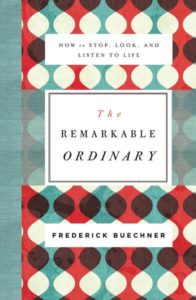 The Remarkable Ordinary: How to Stop, Look, and Listen to Life Frederick Buechner (Zondervan) $16.99 One need only read a few pages in to this book to hear that classic voice of Buechner, the Presbyterian minister who was called mostly to be a writer, and who was short-listed for both the Pulitzer and the prestigious American Book Award. He has that cadence and that oddly plain sort of phrases; he is telling how some people are clear about their jobs and how he sometimes envies, them, those who can reply. You know, people like “sausage stuffers.” I have to admit I didn’t see that coming and it made me smile.
The Remarkable Ordinary: How to Stop, Look, and Listen to Life Frederick Buechner (Zondervan) $16.99 One need only read a few pages in to this book to hear that classic voice of Buechner, the Presbyterian minister who was called mostly to be a writer, and who was short-listed for both the Pulitzer and the prestigious American Book Award. He has that cadence and that oddly plain sort of phrases; he is telling how some people are clear about their jobs and how he sometimes envies, them, those who can reply. You know, people like “sausage stuffers.” I have to admit I didn’t see that coming and it made me smile.
He is a fine writer, and honest storyteller, and it is a publishing occasion of great, great note that editors somewhere found these previously unpublished lectures. These chapters — all but one never published before — were drawn from his famed “Laity Lodge” lectures and presentations given in the 1987 Norton lectures. He was at the height of his fame, perhaps, and are the top of his game. And now, we have what is essential a new book from those years, a publishing event, indeed.
The theme of this is classic Buechner — we are all living ordinary lives but it all really is quite extraordinary. We have to “listen to our lives” and pay attention, noting the beauty and grace all around us, even despite the great woundedness we know and the sorry we carry. Buechner has told some of his own sorries in his many memoirs and he has addressed the hurts of the world often. (See the new compilation of stuff he’s written about that noted above, A Crazy, Holy Grace.) But here, in this Remarkable Ordinary book, he really does invite us to see what God is doing in our lives, to uncover the plot of our life’s story, to see “the sacred opportunity to connect with the divine each moment.”
Some of this is memoir and storytelling, as you would expect from a writer like this. Some of it is theological rumination that is profound, but not scholarly. Some of it nears contemplative spirituality, but it isn’t exactly about mindfulness or prayer, at least not mostly. Some of it is actually about his own calling as a writer and how he connects with artists.
We honor this good book not only for its own wonder and insight but for the project itself, for the folks like John Sloan and Caleb Seeling and folks at Zondervan who saw the value in introducing this notable writer of considerable talent to a new generation. For that, this surely deserves a huge shout out from all who love the printed page, who appreciate intelligent religious writing, and who are glad for books like this gracing the marketplace. Kudos one and all.
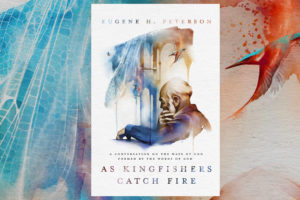 As Kingfishers Catch Fire: A Conversation on the Ways of God Formed by the Words of God Eugene H. Peterson (Tyndale) $24.99 There are many people who name some of Peterson’s many books (for instance, A Long Obedience in the Same Direction or Working the Angels, or his book on David, or the one on the Psalms as a way to pray, or Reversed Thunder, a marvelous book on Revelation. His five volume set of “spiritual theology” are mature and extraordinary, weighty books anyone serious about Christian faith should work thorough. I am not alone, certainly not alone, in saying that he is one of the more substantive, popular writers of our day. His autobiographical memoir is called Pastor and that is how he mostly wants to be remembered.
As Kingfishers Catch Fire: A Conversation on the Ways of God Formed by the Words of God Eugene H. Peterson (Tyndale) $24.99 There are many people who name some of Peterson’s many books (for instance, A Long Obedience in the Same Direction or Working the Angels, or his book on David, or the one on the Psalms as a way to pray, or Reversed Thunder, a marvelous book on Revelation. His five volume set of “spiritual theology” are mature and extraordinary, weighty books anyone serious about Christian faith should work thorough. I am not alone, certainly not alone, in saying that he is one of the more substantive, popular writers of our day. His autobiographical memoir is called Pastor and that is how he mostly wants to be remembered.
As Kingfishers Catch Fire is a lovely hardback collection of nearly 50 sermons and lectures Peterson gave in the early days of his church planting days at Christ Our King Presbyterian Church in Bel Air, MD. This is where is all started, where he wrote his first books and cooked up the idea for The Message, there among, as he puts in, Kittel and coffee cups. Although preached nearly sixty years ago, these sermons (some of which reference the race riots of the last 60s and the Viet Nam war) would stand up in any pulpit today. Reading them now will edify any pastor, Bible scholar, or church member who needs an eloquent diet of solid, interesting, mature spiritual theology.
We want to award this a special honorary mention because it may be the last book we have from Pastor Pete. At least that is what we’ve heard. If so, it is a beautiful and sizable contribution, a very good way to bookend his prodigious publishing ministry.
Here are the sections, with seven sermons under each, accumulating almost 500 pages of good bread for that long obedience in the same direction:
- He Spoke and It Came to Be: Preaching in the Company of Moses
- All My Springs Are You: Preaching in the Company of David
- Prepare the Way of the Lord: Preaching in the Company of Isaiah
- On Earth As It Is In Heaven: Preaching in the Company of Solomon
- Yes and Amen in Jesus: Preaching in the Company of Peter
- Christ in You the Hope of Glory: Preaching in the Company of Paul
- In the Beginning was the Word: Preaching in the Company of John of Patmos
I like the endorsement of Glenn Packiam (of New Life Church in Colorado Springs) who says this:
There is no one who has done more to shape my ‘pastoral imagination’ than Eugene Peterson. Now, through this extraordinary collection, we see how words become pastoral work. An exegete and a poet, Peterson opens up to us not only the text but its world, welcoming us to walk with Moses, David, Isaiah, Solomon, Peter, Paul, and John. And as we do, we find ourselves keeping company with Jesus. Read it devotionally; read it as a study in sacred storytelling; read it to come alive along the Jesus Way.
Congratulations to Eugene Peterson. And kudos to the good folk at Bel Air Presbyterian who, as he says, “listened with appreciation to my sermons for twenty-nine years, and their prayers were a substantial factor in what was preached.”
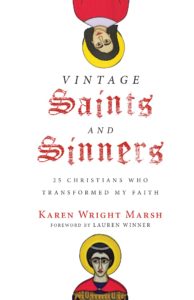 Vintage Saints and Sinners: 25 Christians Who Transformed My Faith Karen Wright Marsh (IVP) $20.00 There is so much to love about this book I hardly know where to begin. I think I will just reprint some of what I wrote when I discussed it in a previous BookNotes. My enthusiasm hasn’t waned — this is a great book to dip in to, to learn from, to live with as you realize these older Christian folks can speak into our own lives. This is great stuff, award winning, in our view. Here is some of what I said before:
Vintage Saints and Sinners: 25 Christians Who Transformed My Faith Karen Wright Marsh (IVP) $20.00 There is so much to love about this book I hardly know where to begin. I think I will just reprint some of what I wrote when I discussed it in a previous BookNotes. My enthusiasm hasn’t waned — this is a great book to dip in to, to learn from, to live with as you realize these older Christian folks can speak into our own lives. This is great stuff, award winning, in our view. Here is some of what I said before:
It is handsomely designed, from the cover to the matching inside flyleaves. It is well written. It teaches about saints we’ve heard of and some we haven’t.
Another thing to love — there is a stellar, wonderfully-written foreword by Lauren Winner. I’ve read the whole introduction twice and just have to share this paragraph, that heads off at the pass a concern some of us may have about a book of hagiography:
In part because saints live in weird relation to the world, inviting saints into your life can be tricky. Indeed, reading about a saint can occasionally induce despair. I read about the heroism of Sophie Scholl, and the demons who accompany me on my daily rounds perk up and say, “If the standard is staring down Hitler and being guillotined on treason charges, why not admit that you’re not really trying to live like Jesus at all? You can even consistently remember to bring canned goods to church on the first Sunday of the month.” And then the demons are off to the races, explaining that I’m a pathetic excuse for a Christian and suggesting that instead of praying Evening Prayer, I rewatch the second season of House of Cards.
And then Winner says, in a move that surprised and helped me:
Here’s the thing to say to those demons (I manage to say it about one-third of the time.): I don’t read the saints in order to imitate them. I read about the saints because they show me something about myself.
Winner advises that we read Marsh’s Vintage Saints and Sinners while noticing what saints hold your attention. Some will intrigue you, some might repel you. Winner suggests that the Holy Spirit is involved in adjudicating this process. She says, “I suspect that over our lives, each of us is given two or three or four saints with whom to live in particular intimacy. Your three or four will be different from mine because you’re gifted in ways I’m not, and because you’re damaged in ways I’m not. Which saints is God offering you, to help illumine and burnish your particular gifts, and to help illumine and heal your particular damages?”
Well, Karen Wright Marsh is a perfect guide for helping you learn about and find some saints to accompany you. She is an excellent writer and a fine historian and has been working on this book, it seems, for a long time, learning and growing into these varying visions of a life well lived for God. Marsh herself has a philosophy degree from Wheaton College and a in linguistics from the University of Virginia. She is the cofounder and director of Theological Horizons, a university ministry that has promoted theological scholarship at the intersection of faith, thought, and life since 1991. Her husband is Charles Marsh, himself a Bonhoeffer scholar and a vibrant historian of the civil rights movement. They are both involved in the UVA “lived theology” projects.
This is a wonderful resource, years in the making, I gather, and one of the Best Books of 2017. Cheers!
BEST YEAR-LONG DEVOTIONALS
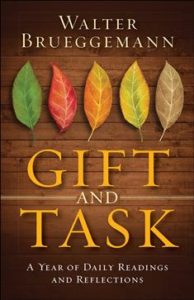 Gift and Task: A Year of Daily Readings and Reflections Walter Brueggemann (WJK) $20.00. I have longed thought this would be an amazing resource — a page a day collection of short pieces by Walt, based on the lectionary readings. Of course whether you are a lectionary-fan or not, this is a page-a-day set of short pieces by the one who is arguably the most important Biblical scholar of our day. His evocative and controversial works have riveted us for a generation, now, and to finally have a short way into his fertile, Biblical mind is a true gift. This book has been long awaited and wished for. Three big cheers!
Gift and Task: A Year of Daily Readings and Reflections Walter Brueggemann (WJK) $20.00. I have longed thought this would be an amazing resource — a page a day collection of short pieces by Walt, based on the lectionary readings. Of course whether you are a lectionary-fan or not, this is a page-a-day set of short pieces by the one who is arguably the most important Biblical scholar of our day. His evocative and controversial works have riveted us for a generation, now, and to finally have a short way into his fertile, Biblical mind is a true gift. This book has been long awaited and wished for. Three big cheers!
Not too surprisingly, Walt says this in a very moving forward, as he describes to things that distinguish this set of reflections:
First, I have written reflections that are intended for serious church members who are willing to consider in critical ways the cost and joy of discipleship. This means that I have resisted any temptation toward a more generic “devotional.” Because most materials offered in that genre are, in my judgement, quite romantic. Second, while I have not imposed much critical scholarship on the texts, I intend that may exposition should be citric all responsible and not excessively accommodated to popular itches.
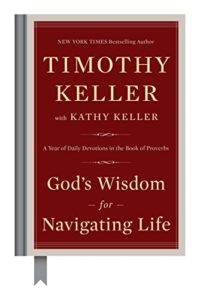 God’s Wisdom for Navigating Life: A Year of Daily Devotions in the Book of Proverbs Timothy & Kathy Keller (Viking) $20.00 It is hard not to want to recognize, celebrate and award every new book by this prodigious author and former pastor of a church plant in Manhattan that has attracted thousands of sophisticated, often unchurched, New Yorkers. Keller has a worldview that allows him to see God’s hand in all things, that recognizes the Lordship of Christ in all areas of life, and that desires Biblical fidelity and cultural relevance in ways that bear fruit for the glory of God and Kingdom of Christ. He’s thoughtful, eloquent, sophisticated without putting on urbane airs. I like him immensely and respect his writing. This daily devotional, handsomely designed with gold edge pages and ribbon marker, like last year’s wonderful Songs of Jesus on the Psalms, has he and his wife, Kathy, ruminating a bit on each section of Proverbs. It is wisely not just a simple meditation on each and every Psalm in order, but it groups them thematically. This is solid from a textual view (Calvin Seerveld taught us years ago that our notion of reading each individual Proverb like some Ben Franklin-esque aphorism isn’t literarily right) and makes it more useful, too, plumbing a wise theme about this or that topic of life. This is not simplistic or cheesy or romantic “inspiration” of the sort Brueggemann mocks above. It offers solid, beautifully done, helpful, if brief, readings for each day of the year. Highly recommended.
God’s Wisdom for Navigating Life: A Year of Daily Devotions in the Book of Proverbs Timothy & Kathy Keller (Viking) $20.00 It is hard not to want to recognize, celebrate and award every new book by this prodigious author and former pastor of a church plant in Manhattan that has attracted thousands of sophisticated, often unchurched, New Yorkers. Keller has a worldview that allows him to see God’s hand in all things, that recognizes the Lordship of Christ in all areas of life, and that desires Biblical fidelity and cultural relevance in ways that bear fruit for the glory of God and Kingdom of Christ. He’s thoughtful, eloquent, sophisticated without putting on urbane airs. I like him immensely and respect his writing. This daily devotional, handsomely designed with gold edge pages and ribbon marker, like last year’s wonderful Songs of Jesus on the Psalms, has he and his wife, Kathy, ruminating a bit on each section of Proverbs. It is wisely not just a simple meditation on each and every Psalm in order, but it groups them thematically. This is solid from a textual view (Calvin Seerveld taught us years ago that our notion of reading each individual Proverb like some Ben Franklin-esque aphorism isn’t literarily right) and makes it more useful, too, plumbing a wise theme about this or that topic of life. This is not simplistic or cheesy or romantic “inspiration” of the sort Brueggemann mocks above. It offers solid, beautifully done, helpful, if brief, readings for each day of the year. Highly recommended.
BEST THEOLOGY BOOKS
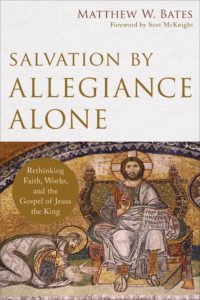 Rethinking Faith, Works, and the Gospel of Jesus the King Matthew W. Bates (Baker Academic) $24.99 Agree fully or not (geesh, even understand it fully or not) this is a extraordinary contribution, a great book, what New Testament scholar Michael Gorman calls a “bold, provocative… a much-needed corrective.” As you may guess (and if you read in this field, you’ve surely heard about this as it has been widely discussed) that it struggles with the question of “cheap grace” and what it really means to be saved by faith alone, if that faith is, in fact the Biblical sort that demands fidelity, works, embodiment, service. Scot McKnight — who calls it “an outstanding book” wrote the good foreword, saying:
Rethinking Faith, Works, and the Gospel of Jesus the King Matthew W. Bates (Baker Academic) $24.99 Agree fully or not (geesh, even understand it fully or not) this is a extraordinary contribution, a great book, what New Testament scholar Michael Gorman calls a “bold, provocative… a much-needed corrective.” As you may guess (and if you read in this field, you’ve surely heard about this as it has been widely discussed) that it struggles with the question of “cheap grace” and what it really means to be saved by faith alone, if that faith is, in fact the Biblical sort that demands fidelity, works, embodiment, service. Scot McKnight — who calls it “an outstanding book” wrote the good foreword, saying:
The superficiality of American evangelicalism’s gospel-obsessions with security and assurance has led me at times to wonder if the should not teach justification by discipleship. Or justification by faithfulness. But Matthew Bates has landed on a beautiful and biblically sound term: allegiance.
Obviously, faith is, Biblically speaking, more than mere intellectual assent, but trust. Not what we sometimes call “easy believism.” And Bates’s rethinking of whole-life discipleship loyal to King Jesus is written, as Gorman reminds us, with scholarship offered out of “zeal for the Kingdom and concern for the church.” Right on!
The erudite professor Michael Bird of Ridely College in Australia, and a very active and significant evangelical theologian, says:
Bates forces us to rethink the meaning of faith, the gospel, and works, with a view to demonstrating their significance for true Christian discipleship. This will be a controversial book, but perhaps it is the controversy we need.
Joshua Jipp of Trinity Evangelical Divinity School shows that this isn’t shallow grandstanding or over-the-top speculation, and illustrates why we want to honor it as one of the most important books in this category this year:
Bates makes a powerful argument that the New Testament writings find their climax in their portrait of Christ as the enthroned king. The right response to this king is not simply trust or intellectual assent but rather wholehearted allegiance. Bates’s reframing of faith, works, and the gospel is a necessary correction to prevalent distortions of Jesus’s gospel. This is an important argument written by a creative, careful, and trustworthy biblical interpreter.
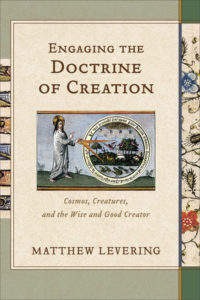 Engaging the Doctrine of Creation: Cosmos, Creatures, and the Wise and Good Creator Matthew Levering (Baker Academic) $44.99 Levering, who holds his PhD from Boston College, is a well-respected Roman Catholic theologian and Biblical scholar. He is respected across the theological spectrum as is indicated by the rave, rave reviews on this serious work from voices such as Bruce Marshal (of Perkins School of Theology at Southern Methodist) and Kevin Vanhoozer (of Trinity Evangelical Divinity School) and the orthodox scholar David Bentley Hart (who writes for First Things) and Lewis Ayres of Durham University and the Neo-anabaptist Scot McKnight (who says it is “the best of Catholic Theology by the best of Catholic theologians.” Of course many fellow Catholics have raved about this as well.
Engaging the Doctrine of Creation: Cosmos, Creatures, and the Wise and Good Creator Matthew Levering (Baker Academic) $44.99 Levering, who holds his PhD from Boston College, is a well-respected Roman Catholic theologian and Biblical scholar. He is respected across the theological spectrum as is indicated by the rave, rave reviews on this serious work from voices such as Bruce Marshal (of Perkins School of Theology at Southern Methodist) and Kevin Vanhoozer (of Trinity Evangelical Divinity School) and the orthodox scholar David Bentley Hart (who writes for First Things) and Lewis Ayres of Durham University and the Neo-anabaptist Scot McKnight (who says it is “the best of Catholic Theology by the best of Catholic theologians.” Of course many fellow Catholics have raved about this as well.
For instance, listen to John Cavadini, the McGrath Institute for Church Life professor at the University of Notre Dame:
This book is breathtaking in its scope and astonishing in its erudition and creativity. The doctrine of creation suffered gradual attenuation in the theology of the twentieth century, and this book–engaged with modern science and philosophy but not limited to that engagement–is a welcome and refreshing accomplishment in retrieval and reinvigoration. It will prove useful in undergraduate and graduate education alike as well as for any interested educated reader
Who wouldn’t want to honor a book that is considered “breathtaking” and “astonishing”?
Although readers of BookNotes will know why I’m drawn to this — the goodness of creation as the “theatre of God” (as Calvin put it) that is ordered by God and upheld by Christ is a chief truth about reality and everything we do — I like that it resonates also with other concerns we have about how to understand our life and times and how the Bible story can give shape to our own lives.
Listen to this rave review by Reinhard Hutter of The Catholic University of America and how he notes themes that are so very important to us:
Engaging the Doctrine of Creation is an illuminating ecumenical symphony of a vast array of splendid theological and philosophical voices from the Christian past and present, which have been gathered and prompted by Matthew Levering with his unique gift as a theological conductor. Levering unfolds once more the sublime and unfathomable depth, height, and breadth of the Christian doctrines of creation, fall, and redemption. In light of widespread contemporary doubts about the creation of the universe, the intelligibility of original sin, and the possibility of redemption, this book is of immediate relevance for every serious student and teacher of Christian theology, whether Protestant, Orthodox, or Catholic.
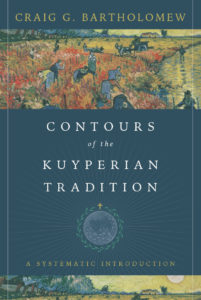 Contours of the Kuyperian Tradition: A Systematic Introduction Craig G. Bartholomew (IVP Academic) $40.00. I will admit that I haven’t even read all of this but I know it is a resource I will cherish for the rest of my life. This offers, in broad, but serious, theological tones, a sweeping overview of the contours of the worldview we have embraced, the vision of life which has informed us deeply. I have written elsewhere, most HERE, how learning about this Biblical vision of whole-life restoration brought on by Christ’s Kingdom — described often as “creation re-galned” and “all of life redeemed” — helped shape our own sense of calling and why we have the bookstore as we do. From Christian engagement with the arts to Biblical thinking about social justice to our ecumenical theology to our interest in philosophy and cultural criticism, to our many resources about vocation, calling, work and serving God in one’s careers, all of this has, in one way or another, be influenced by those who have been influenced by the neo-Calvinism of Abraham Kuyper. This is doubtlessly the best overview of Kuyperian thought and the best theological foundation for moving more deeply into that rich tradition.
Contours of the Kuyperian Tradition: A Systematic Introduction Craig G. Bartholomew (IVP Academic) $40.00. I will admit that I haven’t even read all of this but I know it is a resource I will cherish for the rest of my life. This offers, in broad, but serious, theological tones, a sweeping overview of the contours of the worldview we have embraced, the vision of life which has informed us deeply. I have written elsewhere, most HERE, how learning about this Biblical vision of whole-life restoration brought on by Christ’s Kingdom — described often as “creation re-galned” and “all of life redeemed” — helped shape our own sense of calling and why we have the bookstore as we do. From Christian engagement with the arts to Biblical thinking about social justice to our ecumenical theology to our interest in philosophy and cultural criticism, to our many resources about vocation, calling, work and serving God in one’s careers, all of this has, in one way or another, be influenced by those who have been influenced by the neo-Calvinism of Abraham Kuyper. This is doubtlessly the best overview of Kuyperian thought and the best theological foundation for moving more deeply into that rich tradition.
As the author of the magisterial, definitive biography of Abraham Kuyper, James Pratt (who wrote Abraham Kuyper, Modern Calvinist, Christian Democrat) put it,
Craig Bartholomew has given us this clear, thorough overview of Kuyper’s original insights, their further development, and their relevance in the postmodern world.
I wish I could think of very clever name for the award we want to give to this outstanding and important book. I am sure that those who don’t know much about the famous Dutch statesman and activist and pious devotional writer will find this book an engaging, important introduction. I hope it is read by those curious about all this. Those who see themselves as Kuyperian or reformational will know it is simply a must-have volume — come on, order it soon! Contours of the Kuyperian Tradition is indispensable, significant, deserving of great accolades. Maybe our little, small-town (“de kleine luyden”) Best Book Award will help. Kudos!
BEST BOOK ON ECUMENISM
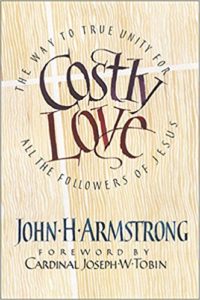 Costly Love: The Way to True Unity for All the Followers of Jesus John H. Armstrong (New City Press) $15.95 This is a beautiful, good, important book and I’m not sure quite where to place it. It isn’t simplistic Christian living, although it is not an academic, scholarly theology text for the guild, either. It is somewhat about church life, and the vision John has is clearly the ecumenical relationships among the whole Body of Christ — I hope your congregation or parish cares about such things. Armstrong wrote what I still take to be the best book on ecumenical concerns a few years ago, somewhat inspired by a piece by J.I. Packer, called Your Church Is Too Small: Why Unity in Christ’s Mission is Vital to the Future of the Church. It might be said that this is a sequel; or, maybe a prequel. How do we get to a bigger vision of the church, an inter-denominational sense of unity, unless we learn to love across our differences? From the famous call to love one another most poignantly given in John 13:34, Armstrong not only tells us how we are to be one with one another, living in love, but how this is, in fact, a central concept of who God is, God’s own identity. He roots our work for unity in the character of God.
Costly Love: The Way to True Unity for All the Followers of Jesus John H. Armstrong (New City Press) $15.95 This is a beautiful, good, important book and I’m not sure quite where to place it. It isn’t simplistic Christian living, although it is not an academic, scholarly theology text for the guild, either. It is somewhat about church life, and the vision John has is clearly the ecumenical relationships among the whole Body of Christ — I hope your congregation or parish cares about such things. Armstrong wrote what I still take to be the best book on ecumenical concerns a few years ago, somewhat inspired by a piece by J.I. Packer, called Your Church Is Too Small: Why Unity in Christ’s Mission is Vital to the Future of the Church. It might be said that this is a sequel; or, maybe a prequel. How do we get to a bigger vision of the church, an inter-denominational sense of unity, unless we learn to love across our differences? From the famous call to love one another most poignantly given in John 13:34, Armstrong not only tells us how we are to be one with one another, living in love, but how this is, in fact, a central concept of who God is, God’s own identity. He roots our work for unity in the character of God.
What Christian of any age doesn’t know this, that God is love? Who doesn’t know the great, central love command, to love God and others? But yet, important as it is, when have you last read a somewhat sustained, serious study of this topic? For many, we never have!
The unity we have as members of the church of Christ is a gift and a obligation; we are to steward the reality of the oneness that is a given in Christ, but to do that we have to, as we say these days, “live into it.” Costly Love will show you how.
We tip our hat to John and his Act 3 Network and their latest project The Initiative. We honor his faith, his work, and, now, his recent book, Costly Love, one of the most important of 2017. Order it today.
BEST BOOKS OF PERSONAL SELF-IMPROVEMENT
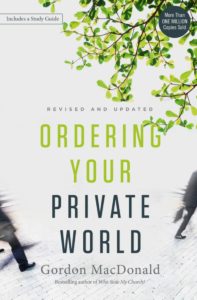 Ordering Your Private World: Revised and Updated Gordon MacDonald (Nelson) $16.99. I have said everywhere I’ve gone this past half a year that this new edition of a classic from the 1970s, is truly one of the most important books I’ve read. MacDonald’s clear-headed prose and illuminating storytelling and wise instruction about priorities and boundaries and the health of our interior lives made a difference for me decades ago, and re-reading some of it again reminded me of how very, very glad we are that MacDonald is still writing. We stock all of his books and it is hard to pick a favorite; this one has sold over a million copies and, now with contemporary revisions and a new study guide, Ordering Your Private World should reach a new generation of readers, or refresh those who need a straight-forward reminder of the value of rest, prayer, study, using our time well and what it means to live “from the inside out.” There is no doubt that our public effectiveness is deeply linked to our inner resources. This book deserves great credit and you would be wise to spend some time with it.
Ordering Your Private World: Revised and Updated Gordon MacDonald (Nelson) $16.99. I have said everywhere I’ve gone this past half a year that this new edition of a classic from the 1970s, is truly one of the most important books I’ve read. MacDonald’s clear-headed prose and illuminating storytelling and wise instruction about priorities and boundaries and the health of our interior lives made a difference for me decades ago, and re-reading some of it again reminded me of how very, very glad we are that MacDonald is still writing. We stock all of his books and it is hard to pick a favorite; this one has sold over a million copies and, now with contemporary revisions and a new study guide, Ordering Your Private World should reach a new generation of readers, or refresh those who need a straight-forward reminder of the value of rest, prayer, study, using our time well and what it means to live “from the inside out.” There is no doubt that our public effectiveness is deeply linked to our inner resources. This book deserves great credit and you would be wise to spend some time with it.
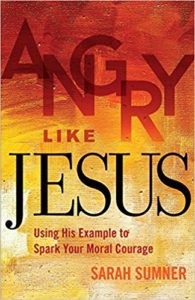 Angry Like Jesus: Using His Example to Spark Your Moral Courage Sarah Sumner (Fortress) $16.99 I want to honor this book for any number of reasons, one of which is I don’t know too many books on the mostly theologically liberal ECLA Fortress Press that have endorsing blurbs from J.I. Packer and former managing editor of Christianity Today Katelyn Beaty. I am glad to see a mainline denominational house publishing a woman mentored by Carl Henry and Dallas Willard. So that’s worthy of celebration.
Angry Like Jesus: Using His Example to Spark Your Moral Courage Sarah Sumner (Fortress) $16.99 I want to honor this book for any number of reasons, one of which is I don’t know too many books on the mostly theologically liberal ECLA Fortress Press that have endorsing blurbs from J.I. Packer and former managing editor of Christianity Today Katelyn Beaty. I am glad to see a mainline denominational house publishing a woman mentored by Carl Henry and Dallas Willard. So that’s worthy of celebration.
More importantly, this is a great book, very thoughtful, balanced, wise, helpful. It’s not a simplistic self-improvement book informed mostly by popular ideas but is deeply shaped by engagement with the Biblical text. Listen to what John Burke (author of No Perfect People Allowed: Creating a Come as You Are Culture at Church) says of it:
As I have found with all of Sarah Sumner’s writing, this book makes you grapple with deep theological thoughts in hard-hitting, practical ways that will change your life for the better. Sumner brilliantly unmasks the false idea that anger and love can’t go together, and, in the process, helps the reader become more living precisely by showing us how to be angry in healing ways.
I bet you know somebody who needs this; maybe it would make a good study for a group, opening us up more generally to being more healthy about how we express our emotions. This is a very fine resource, highly recommended. Three cheers.
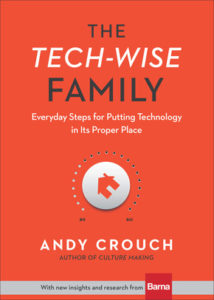 The Tech Wise Family: Everyday Steps for Putting Technology in It’s Proper Place Andy Crouch (Baker Books) $13.99 We have a handful of other fine books on this topic that have released this year and we are glad. Parents we know — heck, oldsters like ourselves! — are trying to figure out how to handle wisely the whole world of devices, digital culture, the role of screens and computers. Most of the best such books realize that there is a deep question about lifestyle, embodiment in the world, postures of cultural engagement, and a host of other background stuff rather than merely the question of, say, on-line porn or texting while driving. But I am confident that there is no book on the market that paints the bigger picture as helpfully and succinctly as this wise little book by my friend Andy Crouch. It is nothing short of marvelous, a truly wonderful book and one I cannot say enough about to anyone, everywhere.
The Tech Wise Family: Everyday Steps for Putting Technology in It’s Proper Place Andy Crouch (Baker Books) $13.99 We have a handful of other fine books on this topic that have released this year and we are glad. Parents we know — heck, oldsters like ourselves! — are trying to figure out how to handle wisely the whole world of devices, digital culture, the role of screens and computers. Most of the best such books realize that there is a deep question about lifestyle, embodiment in the world, postures of cultural engagement, and a host of other background stuff rather than merely the question of, say, on-line porn or texting while driving. But I am confident that there is no book on the market that paints the bigger picture as helpfully and succinctly as this wise little book by my friend Andy Crouch. It is nothing short of marvelous, a truly wonderful book and one I cannot say enough about to anyone, everywhere.
Yes, it is mostly about parenting, and yes, it looks at key principles and practices that can be embraced in the tech-wise home. But, again, whether you are in a family with children or not, “reclaiming real life” in a virtual world is a task for all of us these days.
If you follow BookNotes you will not be surprised to know that we want to award this as one of the very best little books of 2017. It follows Andy’s other important works ( all three of which are among my all time favorite books —Culture Making, Playing God, and Strong and Weak) as titles that are eloquent and thoughtful and enjoyable.
Listen to what Shauna Niequist says:
A vision for family life and faith and character so compelling and inspiring that it made me weep, made me reconsider many aspects of our home, made me profoundly thankful for this beautiful and important book.
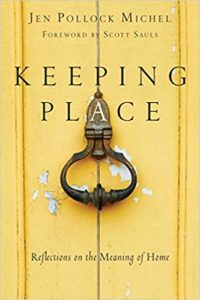 Keeping Place: Reflections on the Meaning of Home Michel Jen Pollock (IVP) $16.00 Nearly written as a memoir, this beautiful paperback is an evocative call to a sense of place, to remember our homes, to be home-makers that are hospitable and caring.
Keeping Place: Reflections on the Meaning of Home Michel Jen Pollock (IVP) $16.00 Nearly written as a memoir, this beautiful paperback is an evocative call to a sense of place, to remember our homes, to be home-makers that are hospitable and caring.
As one reviewer put it:
Home is our most fundamental human longing. And for many of us homesickness is a nagging place of grief. This book connects that desire and disappointment with the story of the Bible, helping us to see that there is a homing God with wide arms of welcome — and a church commissioned with this same work.
We loved Pollock’s last wonderfully-written book, Teach Us to Want: Longing, Ambition & the Life of Faith which we awarded as a Best Book of 2014. Congratulations, Jen, and thank you, for inviting us into your own ruminations on homemaking and place-keeping, in this wonderful, wonderful read. Keeping Place is surely one of the Best Books of 2017.
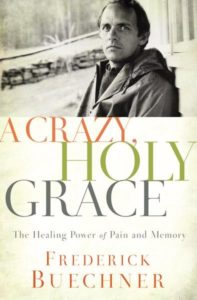 A Crazy, Holy Grace: The Healing Power of Pain and Memory Frederick Buechner (Zondervan) $16.99. Okay, I’m just going to say it: how can we not award a new Frederick Buechner book with a “best of” award? Granted, much of this has been previously published (there is one fully new chapter that had never been released) but it is compiled and pulled together expertly by editor par excellence, Caleb Seeling, gleaning from Buechner’s larger body of work and give us this one, fine, themed volume. That is, in Crazy, Holy Grace, we have a collection of Buechner pieces from his various books on why God is silent in the midst of pain, how he himself sorted out the hauntedness of memory, the relationship of grief and grace.
A Crazy, Holy Grace: The Healing Power of Pain and Memory Frederick Buechner (Zondervan) $16.99. Okay, I’m just going to say it: how can we not award a new Frederick Buechner book with a “best of” award? Granted, much of this has been previously published (there is one fully new chapter that had never been released) but it is compiled and pulled together expertly by editor par excellence, Caleb Seeling, gleaning from Buechner’s larger body of work and give us this one, fine, themed volume. That is, in Crazy, Holy Grace, we have a collection of Buechner pieces from his various books on why God is silent in the midst of pain, how he himself sorted out the hauntedness of memory, the relationship of grief and grace.
You may know that in a set of on-going memoirs Buechner told secrets from his family, including the story of his father having committed suicide when Buechner was a young boy. He writes about what it means to “steward our pint” and how the “magic of memory” can heal old wounds. Loss comes to all of us, he reminds us, but we are not alone. This new collection of various pieces from nearly a dozen different books where Buechner has addressed these mysteries, compiled together, make it seem like a very coherent, fresh new work. We should be grateful. One of the great publishing gifts of the year!
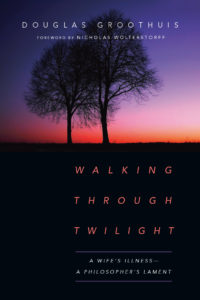 Walking Through Twilight: A Wife’s Illness – A Philosopher’s Lament Douglas Groothuis (IVP) $17.00 Every year there are exceptionally moving memoirs of illness and loss, grief and recovery. I could list five others that are deserving of awards for their honest portrayal of these hard, hard matters. Some very good writers use their abilities to convey what it is like to go through unspeakable hardship and we are the better for it. Although these sorts of books are often tender and vulnerable, the best offer no simple answers as we struggle with the meaning of it all.
Walking Through Twilight: A Wife’s Illness – A Philosopher’s Lament Douglas Groothuis (IVP) $17.00 Every year there are exceptionally moving memoirs of illness and loss, grief and recovery. I could list five others that are deserving of awards for their honest portrayal of these hard, hard matters. Some very good writers use their abilities to convey what it is like to go through unspeakable hardship and we are the better for it. Although these sorts of books are often tender and vulnerable, the best offer no simple answers as we struggle with the meaning of it all.
And yet, there are those, like this one, that are written not only by devout Christ followers but also by professional scholars, theologians, philosophers, and they bring to the writing a certain passion for answers and a certain eloquence and attentiveness to what matters most. I think this amazing book, which I have not yet finished, by a professor of philosophy at Denver Seminary, is one of the best of this sort I’ve read this year.
Groothius has written widely about philosophy, about apologetics, about ethic issues that arise in our postmodern culture. He knows his away around the world and is well equipped to write about heavy stuff. (Don’t you love a book that maturely but accessibly introduces the value of studying theology with a title like Philosophy in Seven Sentences?) But, of course, as we can easily imagine, it is a somewhat different matter when the pain hits close to home.
Groothius’s once-brilliant wife Becky has been hit with the ravages of early on-set dementia. As Doug opens his heart and life and journey to us we come to realize deeply the losses experience by both Doug and Becky and how they descended into this deep darkness. There is excellent writing here, but also incisive thinking.
Listen to what some other thoughtful reviewers have said, to see why we want to honor this book as one of the best books published late in 2017. Fellow apologist and evangelical thinker J.P. Moreland writes:
To be honest, I’ve never read a book like this. It overflows with deep reflection on the suffering of life and the apparent absence of God at the very times we need him most. But the specialness of this book lies in Groothuis’s raw, unfiltered, and bewildering expression of emotion pain, agony, confusion regarding the journey of his dear wife, Becky, and its impact on Doug’s own pilgrimage. There are no cheap Christian slogans, no slapping of a Bible verse as a Band-Aid on a near-mortal wound, no simplistic happily-ever-after. But there is hope. Hope built on deep reflection about Christianity, suffering, and the meaning of life. To me, this is the best book my dear friend has ever written. Its healing powers will penetrate your soul as you slowly read through its pages
Or consider what the esteemed Os Guinness writes:
Would I write as Doug Groothuis does here? Could I even begin to? I was profoundly humbled by this memoir. Philosophers are all about clear thinking, but the classroom is beggared by the anguish described here with such searing honesty, such poetic insight, such intense clarity, and such unconquerable hope.
In the brilliant preface, world-class philosopher Nicholas Wolterstorff explains the value of the book, framing it by the notion of lament. Nic knows this well, as he wrote his own small journal called Lament for a Son which his young adult son died unexpectedly in a climbing accident. That small journal remains a godsend for many, and it is notable that Nic added his voice to those supporting Grootihuis’s poignant book.
We wish this family well and commend this book to you.
BOOKS FOR SPIRITUAL FORMATION
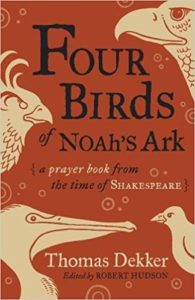 Four Birds of Noah’s Ark: A Prayer Book from the Time of Shakespeare Thomas Dekker, edited by Robert Hudson (Eerdmans) $17.99 Again, this is one of those books that I have talked about often this year, and that is deserving of a huge award (or more than one award.) From the beautifully crafted design, the cover and fonts, to the back-story of how this little-known literary classic came back in to print, Four Birds is a book-seller’s dream. I think it is a book-lover’s dream, too, and many of our customers have agreed. What a joy to have and to hold. Congratulations to Eerdmans (and poet and Bible scholar Robert Hudson) for daring to bring this nearly-lost volume back to print.
Four Birds of Noah’s Ark: A Prayer Book from the Time of Shakespeare Thomas Dekker, edited by Robert Hudson (Eerdmans) $17.99 Again, this is one of those books that I have talked about often this year, and that is deserving of a huge award (or more than one award.) From the beautifully crafted design, the cover and fonts, to the back-story of how this little-known literary classic came back in to print, Four Birds is a book-seller’s dream. I think it is a book-lover’s dream, too, and many of our customers have agreed. What a joy to have and to hold. Congratulations to Eerdmans (and poet and Bible scholar Robert Hudson) for daring to bring this nearly-lost volume back to print.
As I’ve written before, Four Birds of Noah’s Ark was written amidst the black death in the very early 1600’s in London. Each set of prayers—beautifully crafted, Biblically-rich, theologically-mature — comes from one of the four birds, each around a constellation of concerns. It’s a curious metaphor and structure, but what is most interesting is that this prayer-book full of these four different sorts of prayers, was in print for centuries, finally going out of print in the early 20th century (1924 to be exact.) Hudson rediscovered it, edited and adapted it withjust a bit with some helpful annotations; his own preface is itself glorious, by the way, and repays repeated readings. Eerdmans Publishing Co. created a handsome volume (with two color ink and lovely engravings), bringing it wonderfully back into print after this hiatus of nearly a century. It is absolutely one of the most notable books of 2017.
As I noted in my earlier BookNotes review, on the back cover, Karen Swallow Prior writes:
In an age of extemporaneous prayers, it is instructive and delightful to read prayers created within the word-rich age of the English Reformation and wrought with such care. Beautifully crafted, filled with human goodness and biblical truth, these are more than prayers: they are meditations, devotions, and little lessons on what it means to be human and utterly dependent upon God. This is a volume I will return to again and again.
Here is a marvelous little piece written by the editor, imagining that C.S. Lewis introduces Dekker’s prayer book (which he surely was familiar with) to his fellow Inklings at the famous Eager and the Child pub. You’ll love this imaginative essay — just ignore the dumb instructions from EerdWord at the end that fails to suggest buying the book from your favorite indie store. You know better.
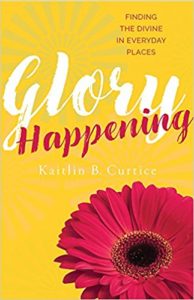 Glory Happening: Finding the Divine in Everyday Places Kaitlin B. Curtice (Paraclete Press) $16.99 I have written before about our interest in what we might call “the spirituality of the ordinary.” Mundane stuff of Earth can reveal much about God and we can “practice the presence” moment-by-moments as we walk corum deo. This is one of the reasons we raved so about our favorite book of last year, Liturgy of the Ordinary by Tish Harrison Warren. This recent book, Glory Happening, seems to be akin to many of these, but yet is is extraordinary; stellar. It is wonderfully written, creative, raw, and colorful. Kaitline Curtice is a Native American Christian author (and worship leader) and sometimes writes for Sojourners. She is a storyteller and lay theologian, a woman yo invites us to “accept the invitation — invest in the glory that surrounds you!” She helps us through these stories and prayers, to open our eyes.
Glory Happening: Finding the Divine in Everyday Places Kaitlin B. Curtice (Paraclete Press) $16.99 I have written before about our interest in what we might call “the spirituality of the ordinary.” Mundane stuff of Earth can reveal much about God and we can “practice the presence” moment-by-moments as we walk corum deo. This is one of the reasons we raved so about our favorite book of last year, Liturgy of the Ordinary by Tish Harrison Warren. This recent book, Glory Happening, seems to be akin to many of these, but yet is is extraordinary; stellar. It is wonderfully written, creative, raw, and colorful. Kaitline Curtice is a Native American Christian author (and worship leader) and sometimes writes for Sojourners. She is a storyteller and lay theologian, a woman yo invites us to “accept the invitation — invest in the glory that surrounds you!” She helps us through these stories and prayers, to open our eyes.
The arrangement of this book that makes it so interesting is that each reflection starts with a reading, often from a curious or fascinating source. How many daily meditations start with an excerpt of Leif Enger’s novel, Peace Like a River, or Geraldine Brooks, or J.R.R. Tolkien or Louisa May Alcott or Henry David Thoreau? These good mediations at least start with a reminder of God’s glory revealed all around us from literary figures, but she also includes more classic mystics, too (Brother David Steindl-Rast or Richard Foster or Celtic theologian J. Philip Newell, for instance.) The page long prayers that follow the reflections are vivid and poetic and the books graphic design helps show them off.
I must admit, I’m not fond of the cover — the font doesn’t grab me and the bright red flower is way too cheery. But with Rachel Held Evans saying how she was stunned by this (“every sentence is a feast for the senses”) and how Ms. Curtice writes with “the insights of a prophet and the attention of a poet” I hope you can imagine how thoughtful this is.
As Brian McLaren explains, in Glory Happening “the author walks with us into the heart of glory, asking what is means to find sacred spaces in everything.” Hooray!
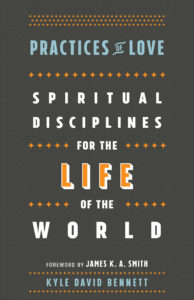 Spiritual Disciplines for the Life of the World Kyle David Bennett (Brazos Press) $17.99 This book attempts to bring a new and needed voice to much of the conversation and teaching about spiritual formation, and it accomplishes so much, it certainly needs to be mentioned in any list of the Best Books of 2017. Starting with a wide-as-life redemption rooted in the orthodox Reformed vision of Abraham Kuyper and others who envision a reformational “common grace for the common good” sort of worldview, Bennett asks, provocatively, what do the classic spiritual practices like prayer, fasting, silence, and the like have to do with our obligation to love our neighbor? He is exploring — among other things, but not least, this — what the connection is between what some might call the “journey inward and the journey outward” and in this regard he is not the first. Richard Foster’s classic Celebration of Discipline, just for instance, certainly has plenty to say about that, as do formation standards by authors like Thomas Merton and Henri Nouwen. Of course this is a huge part of the appeal of Richard Rohr these days. Heck, the old Puritans had a high and holy view of God and God’s nearness and allow that to give them a robustly spiritual view of all manner of stuff (including service to others and holy sex and feasting!) So this isn’t utterly novel, but, yet, there is something going on in this provocative book that invites us to think afresh about relevant and meaningful spiritual disciplines that yield true fruit of love for neighbor.
Spiritual Disciplines for the Life of the World Kyle David Bennett (Brazos Press) $17.99 This book attempts to bring a new and needed voice to much of the conversation and teaching about spiritual formation, and it accomplishes so much, it certainly needs to be mentioned in any list of the Best Books of 2017. Starting with a wide-as-life redemption rooted in the orthodox Reformed vision of Abraham Kuyper and others who envision a reformational “common grace for the common good” sort of worldview, Bennett asks, provocatively, what do the classic spiritual practices like prayer, fasting, silence, and the like have to do with our obligation to love our neighbor? He is exploring — among other things, but not least, this — what the connection is between what some might call the “journey inward and the journey outward” and in this regard he is not the first. Richard Foster’s classic Celebration of Discipline, just for instance, certainly has plenty to say about that, as do formation standards by authors like Thomas Merton and Henri Nouwen. Of course this is a huge part of the appeal of Richard Rohr these days. Heck, the old Puritans had a high and holy view of God and God’s nearness and allow that to give them a robustly spiritual view of all manner of stuff (including service to others and holy sex and feasting!) So this isn’t utterly novel, but, yet, there is something going on in this provocative book that invites us to think afresh about relevant and meaningful spiritual disciplines that yield true fruit of love for neighbor.
The blurbs on the back of this book illustrate how many are taking Bennett seriously. Dennis Okholm (who has written two very good books on how evangelicals and others can learn from Catholic monastic regimens and insights) notes how this book can help us avoid “sanctified narcissism.” He continues:
Bennett’s book is a welcome corrective. He turns the disciplines sideways, and in doing so life gets oriented outward. If you take him seriously your life and your neighborhood will be changed.
Others I respect give rave reviews here — from Vincent Bacote (Director of the Center for Applied Christian Ethics at Wheaton and other of several books about Kuyper and public life) to Gideon Strauss, now a teacher at Toronto’s Institute for Christian Studies, to Rebecca Konyndyk DeYoung, philosophy prof at Calvin College and author of Glittering Vices (a truly brilliant book on the deadly sins) and the former editor of Books & Culture, John Wilson. These lively endorsements mean a lot to me and assured me that I am not alone in thinking there is something very important going on here. Granted, I expressed a few concerns in my own review at BookNotes but that doesn’t mean I don’t want to recognize it as one of the very important releases of 2017. Cheers.
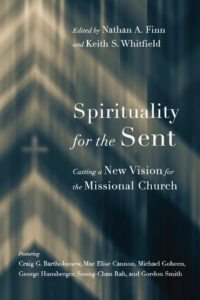 Spirituality for the Sent: Casting a Vision for the Missional Church edited by Nathan A. Finn & Keith S. Whitfield (IVP Academic) $30.00 I admire to being a bit reluctant to honor such an academic and expensive book — with a rather dark cover, no less — in a field of books designed to nurture reader’s souls, form us in intimate friendship with Jesus, and allow us to more deeply walk with God. But, complex as this book is, it is essential reading for anyone serious about spirituality. Spirituality for the Sent carries out this theme of the “journey outward” as it is nourished by deep piety, individually and corporately in faith communities.
Spirituality for the Sent: Casting a Vision for the Missional Church edited by Nathan A. Finn & Keith S. Whitfield (IVP Academic) $30.00 I admire to being a bit reluctant to honor such an academic and expensive book — with a rather dark cover, no less — in a field of books designed to nurture reader’s souls, form us in intimate friendship with Jesus, and allow us to more deeply walk with God. But, complex as this book is, it is essential reading for anyone serious about spirituality. Spirituality for the Sent carries out this theme of the “journey outward” as it is nourished by deep piety, individually and corporately in faith communities.
If this seems like a crossing of genres, here, so be it; I am sure you understand that, typically, spiritual formation focuses on the inner life of the Christian and the missional church discussions have focused on an evaluation of culture and what it means to be aligned with God’s redemptive purposes in all of life. But it isn’t as simple as individuals leaning to pray and discern God’s Spirit and then getting busy going out, scattered in service. The two must be integrated, deeply connected. We need a spirituality of and for the sent ones.
This excellent resource brings together evangelical scholars “to address the relationships between spiritual formation and a mission vision of theology and practice.” With authors such as Craig Bartholomew, Mae Elise Cannon, Michael Goheen, George Hunsberger, Soong-Chan Rah, and Gordon Smith, we have between two covers, some of the best thinkers and writers working these days on this topic. This book deserves a number of awards in a number of categories. We’re glad to honor it here and hope many church leaders take it up and study it prayerfully
BEST BOOKS OF BIBLICAL STUDIES
May I just say that there are so, so many books that have come out in recent years that we admire by authors we respect, in so many fields within Biblical studies, and on so many aspects of the Bible. There are commentaries galore and it doesn’t seem right to compare, say, an academic commentary on Romans with a popular level reflection on the Psalms to a moderate-level guide to James.
And, there are so many good, new Bibles on the market, study editions, fresh translations, even “Readers Editions” (without verse numbers.) Heck, I even have an reflection in a Bible — the Faith and Work Study Bible published by Zondervan in cooperation with leaders at the Center for Faith and Work at Redeemer Presbyterian. Funny, I didn’t even know that my essay was in there, even though I thought we were familiar with this helpful study edition. A friend at a conference pointed it out to me after I denied having anything actually in the Bible. Ha. So there’s that.
Here are just a few stand out resources that I want to give a special shout out about for our year’s end awards for 2017.
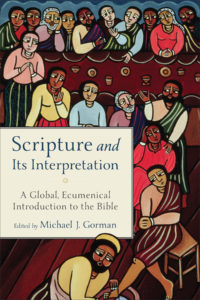 Scripture and Its Interpretation: A Global, Ecumenical Introduction to the Bible edited by Michael J. Gorman (Baker Academic) $ 34.99. This volume is extraordinary, simple an amazing resource, jam-packed with helpful essays by a remarkable array of Bible scholars from all over the world. Edited by the esteemed New Testament scholar from Saint Mary’s Ecumenical Institute in Baltimore, Mike Gorman (author of books on Paul such as the introduction Reading Paul, and heavier works such as Cruciformity, Apostle of the Crucified Lord, Inhabiting the Cruciform God, Becoming the Gospel) this big hardback serves as a overview of varying viewpoints on how to interpret Scripture. This is such a vital topic and it is wise in any such study to hear the most responsible voices from varying places, and this volume helps us.
Scripture and Its Interpretation: A Global, Ecumenical Introduction to the Bible edited by Michael J. Gorman (Baker Academic) $ 34.99. This volume is extraordinary, simple an amazing resource, jam-packed with helpful essays by a remarkable array of Bible scholars from all over the world. Edited by the esteemed New Testament scholar from Saint Mary’s Ecumenical Institute in Baltimore, Mike Gorman (author of books on Paul such as the introduction Reading Paul, and heavier works such as Cruciformity, Apostle of the Crucified Lord, Inhabiting the Cruciform God, Becoming the Gospel) this big hardback serves as a overview of varying viewpoints on how to interpret Scripture. This is such a vital topic and it is wise in any such study to hear the most responsible voices from varying places, and this volume helps us.
There are three major parts to Scripture and Its Interpretation with a handful of chapters under each.
Part 1 is simply called “The Bible.” In this unit you get here seven major pieces about how the Bible canon was formed, what the setting of the Bible is — ancient Israel and early church — and a fascinating chapter called “From There To Here: The Transmission and Translation of the Bible.”
Part 2 is the heart of the book with over a dozen chapters from all over the world on the “Interpretation of the Bible in Various Traditions and Cultures.” Some of these authors you many not know but many are well known. For instance, we have Stephen Fowl, Joel Green and Edith Humphrey and Craig Keener and M. Daniel Carrol, not to mention a good piece by Gorman himself. There are chapters here about Roman Catholic interpretation, pentecostal hermeneutics, Orthodoxy and the Bible, and perspectives on African, African-American, Latino/Latina, and Asian as well as Asian-American interpretation.
Part 3 is nearly worth the price of the book with these four chapters:
- The Bible and Spirituality by Michael Gorman
- Scripture and Ethics by St Mary’s Dean, Brent Laytham
- The Bible and Politics by Christopher Rowland
- Scripture and Christian Community by Jonathan Wilson-Hartgrove
- The Bible and Christian Mission by N.T. Wright
This is a fine book, a good resource which you can dip into often for the rest of your life. Certain chapters might be quite pressing; others will be interesting and edifying if you are open to reading widely. Some may be important to have handy so when you need them you can easily draw upon them. We are big on this book, and happy to name it as one of the Best Biblical Studies books of 2017.
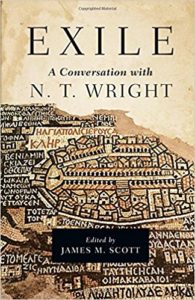 Exile: A Conversation with N. T. Wright edited by James M. Scott (IVP Academic) $40.00. Some of this remarkable book is over my head and I’ll admit that at first glance it may seem a bit arcane. But I am convinced that Biblical themes of exile are very, very important and vital authors such as Walter Brueggemann and Daniel Smith-Christopher (and, in practical ways, Will Willimon & Stanley Hauerwas) and older scholars such as Ralph Klein and Peter Ackroyd have alerted us to this. Small, delightfully practical books have come out on this such as the splendid Beacon Hill study, Embracing Exile: Living Faithfully as God’s Unique People in the World by Scott T. Daniels which in it’s own little way deserves an award for bringing such weighty Biblical themes to modern-day use for ordinary churches.
Exile: A Conversation with N. T. Wright edited by James M. Scott (IVP Academic) $40.00. Some of this remarkable book is over my head and I’ll admit that at first glance it may seem a bit arcane. But I am convinced that Biblical themes of exile are very, very important and vital authors such as Walter Brueggemann and Daniel Smith-Christopher (and, in practical ways, Will Willimon & Stanley Hauerwas) and older scholars such as Ralph Klein and Peter Ackroyd have alerted us to this. Small, delightfully practical books have come out on this such as the splendid Beacon Hill study, Embracing Exile: Living Faithfully as God’s Unique People in the World by Scott T. Daniels which in it’s own little way deserves an award for bringing such weighty Biblical themes to modern-day use for ordinary churches.
So, arcane as it may sound, this is very important stuff and Tom Wright is surely one of the most vocal and impressive scholars these days pushing a certain theory of his about Israel, the second Temple, first century Judaism, Jesus’s own self-understanding, and the ways in which exilic themes come to play in understanding Christ’s Kingdom and the church’s mission. This book, therefore, is vital, important, and, for Bible geeks, at least, certainly one of the most thrilling books of the year.
Here is some of what I wrote about it in a previous BookNotes column:
N.T. Wright has an influential and somewhat contested theory about the First Century Jews believing they were still in exile. He thinks this is very important for how to view the Jewish understanding of the work of the Messiah and therefore how we, too, should interpret Jesus’s words and work. There is a good chapter by Scott about this that sets the stage for the debate in this book and then a very good piece by Tom Wright himself summarizing his generative thesis. Those two chapters are nearly worth the price of the book.
The rest of the book has Old Testament scholars, historians of the first century Judaism culture, New Testament scholars, and theologians weighing in on this. There are about a dozen major chapters. At the end, N.T. Wright has another great chapter responding to his conversation partners. Scholars include well known names such as Walt Brueggemann, Scot McKnight, Hans Boersma, Ephraim Radner, and some men and women who are best known within their own speciality field.
I’m sure Exile: A Conversation with N. T. Wright deserves to be named as one of the Best Books of 2017.
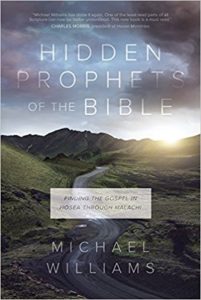 Michael Williams (David C. Cook) $16.99 Thanks be to God for this very fine new study, one that finally fills a remarkable need, I think. For years we have searched for just the right sort of study for small groups and Adult Ed classes or college Bible studies that covered well the Old Testament prophets. Some are, to put it simply, too academic, while a few are too simplistic. A few are several volumes, some don’t handle all the right prophets. Some are so doctrinaire, pushing a certain theological vision while others only focus on the social justice parts. It’s been surprisingly difficult to find works on the so-called minor prophets that are clear about their historical setting, helpful about their basic message, and that helpfully link their visionary messages to the coming of the gospel of Christ.
Michael Williams (David C. Cook) $16.99 Thanks be to God for this very fine new study, one that finally fills a remarkable need, I think. For years we have searched for just the right sort of study for small groups and Adult Ed classes or college Bible studies that covered well the Old Testament prophets. Some are, to put it simply, too academic, while a few are too simplistic. A few are several volumes, some don’t handle all the right prophets. Some are so doctrinaire, pushing a certain theological vision while others only focus on the social justice parts. It’s been surprisingly difficult to find works on the so-called minor prophets that are clear about their historical setting, helpful about their basic message, and that helpfully link their visionary messages to the coming of the gospel of Christ.
Hidden Prophets by Michael Williams does this wonderfully. He is an Old Testament professor at Calvin Theological Seminary in Grand Rapids (and wrote a book called How to Read the Bible Through the Jesus Lens which I think is helpful and the excellent Far As The Curse Is Found: The Covenant Story of Redemption.) What surprised me a bit about this volume is how very interesting it is, how upbeat a writer he can be, and how, at times, down to earth and funny it is. That is, it really is user-friendly without dumbing down significant content. Williams is a profesional PhD but he’s obviously got a heart for communicating well to God’s people. I think this book deserves a very big award for being a very helpful addition to our Biblical literacy.
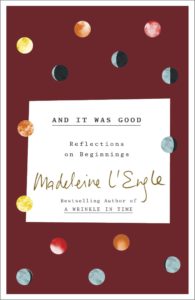
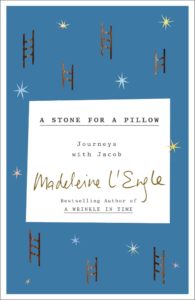
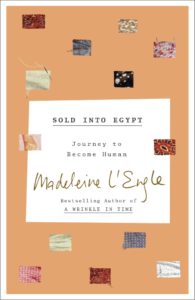
And It Was Good: Reflections on Beginnings Madeleine L’Engle (Convergent) $15.00
A Stone for a Pillow: Journeys with Jacobs Madeleine L’Engle (Convergent) $15.00
Sold Into Egypt: Journeys Into Human Being Madeleine L’Engle (Convergent) $15.00
These three marvelously written, provocative and insightful ruminations on these primal stories from Genesis have been out of print as single volumes for years. (We have a fat paperback that has all three in one.) It is fabulous that they have been made available again, with wonderful new covers and an interesting foreword by Rachel Held Evans. Madeleine L’Engle, as you surely know, was a world-renowned author (most famously of Wrinkle in Time, soon to be released as a major motion picture), an exquisite thinker, a fine reader and writer, a poet, a children’s author, adult fiction author, essayist, memoirist, Bible teacher and librarian. She was a kind and interesting person, as those who knew her attest. She attended a small, evangelically-minded Episcopal church in Manhattan, and nearly all of her books are worth owning. These, especially in these handsome paperbacks, are certainly well-worth reading; they are nearly memoir as she relates the Bible stories to her own life. She draws on the creation story both vividly and wisely as she takes up her own vocation as maker, pondering how the Creator God inspires us to create. And, oh how she loves joining Jacob watching the angles reaching from earth to heaven;, and how her delight gives way to vexing questions, questions about not only the meaning of angels but of the nature of blessing, forgiveness, sexual identity, and more. She wrote Sold Into Egypt during the season of deep bereavement on the loss of her husband, so “joins Joseph on this spiritual expedition as she herself moves through grief.” They have a reader’s guide in the back, now, making them ideal for book clubs or study groups.
I think it is nearly a publishing event that they’ve been re-released and while they are not exactly academic Biblical commentaries, she brings her writer’s eye to her reading of the stories, and shows how her own life is blessed as she sees her own story within the sacred stories. We are grateful for the chance to once again tell people about Madeleine’s Genesis Trilogy and we believe they are worth honoring this year of our Lord, 2017.
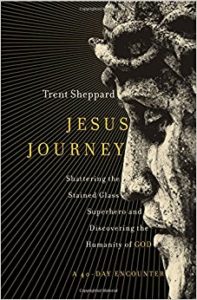 The Jesus Journey: Shattering the Stained Glass Superhero and Discovering the Humanity of God: A 40-Day Encounter Trent Sheppard (Nelson) $16.99 I am so glad we discovered this wonderfully written book. I had recommended for a Sunday school I was teaching this fall for class participants to accompany them as they took up the gospel readings. And I can’t stop thinking about it, and a few folks told me how very much it meant to them.
The Jesus Journey: Shattering the Stained Glass Superhero and Discovering the Humanity of God: A 40-Day Encounter Trent Sheppard (Nelson) $16.99 I am so glad we discovered this wonderfully written book. I had recommended for a Sunday school I was teaching this fall for class participants to accompany them as they took up the gospel readings. And I can’t stop thinking about it, and a few folks told me how very much it meant to them.
Here is some of what I wrote at BookNotes last fall.
The Jesus Journey is wonderfully written, clever, curious, interesting, up-beat, honest, a great read on many level. The author is a theologian that draws on the likes of the big scholarly books of N.T. Wright and a boots-on-the-ground pastor who cares about how people learn to live. He starts off telling about how jolly old Saint Nicholas punched a guy during the Council of Chalcedon (talk about “the Santa I never knew” he quips, alluding to the Phil Yancey book.) He is utterly orthodox and believes we should care – if not throw punches – about the divinity and humanity of Christ. This book is reflection on the life and times of Jesus with a view to his humanity. There are many good books on this these days – don’t miss The Jesus We Missed by Patrick Reardon, just for instance — but this is arranged in 40 short readings. From “Jesus Had an Aunt” to “But Was He Funny?” through to the exquisite telling of Jesus’ last days and a reminder of the dance of the Trinity in the final piece called “In the Beginning” Sheppard will draw you it, give you insight, and create space for real transformation.
At the end of each reading Sheppard invites us into a three-layered process of “Ponder, Pray, Practice.” These are not just mundane or simple summaries, but wise and poignant and useful for your journey. It will help you learn more about the Jesus story and it will help you care. I am sure your relationship with God will be enhanced by this very interesting book.
Sheppard helps to pastor an urban house church called Ekklesia and oversees Alpha’s work with college students in New England. He has read very widely, draws on the best stuff, and is a great storyteller. Most important, he offers these eye-opening reflections by helping us – as the back cover puts it — “”encounter Jesus as if for the first time by experiencing his breathing, heart-beating, body-and-blood, crying-and-laughing humanity.”
I think that deserves some kind of special award. Helping us understand Jesus? Three big cheers for that. It’s one of the best books of its kind that I read this year.
OKAY FRIENDS: STAY TUNED FOR PART TWO, COMING SOON.
PLEASE USE OUR SECURE ORDER FORM (see link below) TO TELL US WHAT YOU WANT (OR CLICK THE INQUIRE LINK TO CONTACT US AND ASK QUESTIONS.) WE APPRECIATE YOUR SUPPORT.
WE HOPE THIS LIST OF WELL-DESERVING HEARTS & MINDS AWARD-WINNING TITLES HELP YOU CELEBRATE SOME OF THE GOOD BOOKS OF THE YEAR AND HELP YOU CONTINUE THE HABIT OF READING WIDELY. THANKS FOR TUNING IN.
LOOK FOR MORE OF OUR 2017 HONORABLE MENTIONS AND BEST BOOK AWARDS IN THE NEXT BOOKNOTES.
BookNotes
SPECIAL
DISCOUNT
ANY ITEM MENTIONED10% Off
order here
this takes you to the secure Hearts & Minds order form page
just tell us what you wantinquire here
if you have questions or need more information
just ask us what you want to know
Hearts & Minds 234 East Main Street Dallastown PA 17313
read@heartsandmindsbooks.com
717-246-3333

